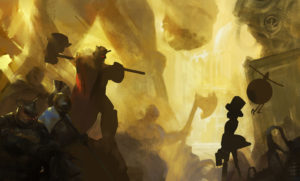While we’re running a Kickstarter campaign for OZombie I’ll be interviewing others who have had experience on the platform. Today, I’m starting with Brian Fargo, leader of inXile, the developers behind Wasteland 2 and Torment: Tides of Numenera.
AJM: You’ve had a long and amazing career in the industry, made awesome games, built companies and managed great teams. Can you give me your “Top 2” lessons learned – and a little detail on the mistakes or trials that lead to understanding those lessons?
BF: It is difficult to boil my thoughts on building teams and games into THE top 2 lessons but I will take a stab at two very important ones for sure. I find that people spend a lot of time designing a game but not much time designing the company itself and ultimately it is great people that make the games and having the proper dynamic in a team or company is paramount. I get plenty of credit for my role in these games but we all know that these larger products are always about a team of people pitching in ideas and talent, no one person can take credit for it all. Every game I have worked on has become bigger than any one human can do so that leaves it to me to make sure I create the right environment for this kind of magic to flourish. The personalities and talents and morale of the group all need to work if you want to make something special. My mistake in this regard was to spend too many hours trying to get an individual to buy off on the vision when it just wasn’t going to happen. It’s important to get that dynamic in place as soon as possible and protect it fiercely.
And I guess the second part of building a great game is to make sure everyone clearly understands the goals and sensibilities you are trying to achieve. This part is along the same lines as the point above except is more product focused and makes it so that the healthy group you have established can soar. When everyone on the team understands the sensibilities it gives more energy to the production and it allows for more of the team to contribute towards it. And defining things in a set of ideals allows for maximum creativity without getting too attached to a narrow set of ideas. Most often I have seen games go sideways because of a contractually tight payment structure that doesn’t allow for enough of a constant tinkering or if there isn’t enough time in the back end of development for the iteration. I really don’t have a true feel of a game until it is well along and playable and only then can I start to address pacing, balance, sign posting, satisfying effects, areas of boredom and excitement etc.
AJM: “DRM-free” is committed to with both your Kickstarter campaigns. Can you talk a bit about the math behind this commitment? Is there any chance the games will generate meaningful revenue after release (outside of the money raised via Kickstarter)? Do they need to in order for you to be “successful” with them? And what’s the definition of success in this context?
I’m not sure of the math but putting DRM on a game ends up pissing off the legitimate users of the game for an impossible battle against pirating. What’s the point? In general I believe that people who were going to buy your game will most likely do so if you get it in front of them somehow. During my days at Interplay we used to do a fair amount of business with the hardware manufacturers bundling our games with a hard drive or a PC in which they paid us only a few dollars for our games and then they could advertise “Comes with $150 of free games.” Well they would sell hundreds of thousands of units with our games and no matter how much volume they did our retail sales never dipped. There are just audiences of people who are buyers and others that won’t pay or weren’t going to buy it anyway. And beyond that we have been pre-paid to make this game so it would be doubly outrageous to then add DRM to the very people who made it possible. I’m not entirely certain what is possible from a sales perspective outside our backers but I feel pretty strongly that when we deliver the
epic, moody and reactive game that we promised that its sales will match that of other games of scope, scale and excellence.
AJM: What non-gaming topic has you most intrigued these days and why? Just curious if there’s something you’re following in the news that you’d like to share your thoughts on.
I’ve been in the gaming business for 30 years and when I speak to folks outside the field there are generally very few follow up questions when I tell them what I do. But now with crowd funding I have more interest in my business activities and ideas than ever before which further cements how important and powerful this new concept is. I’ve always felt that money in the hands of individuals has a greater chance of doing good and being used to help others over what corporations do with it. Removing the gatekeepers will allow more profit and rights to be held by people who are not beholden to shareholders or feel the need to crush all competition. I like to do my part in helping progress this movement which has come in the form of Kicking it Forward, tweeting about interesting projects, supporting projects financially and giving advice to my crowd funded “competitors” where I can. We need to help make it so more of the money goes into the hands of the people who are actually doing the creation and I know most every creative industry feels the same way.

